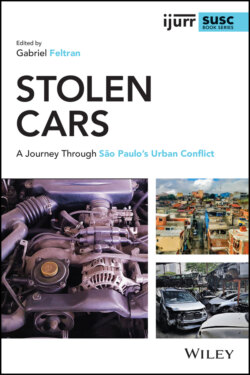Stolen Cars

Реклама. ООО «ЛитРес», ИНН: 7719571260.
Оглавление
Группа авторов. Stolen Cars
IJURR Studies in Urban and Social Change Book Series
STOLEN CARS. A Journey Through São Paulo’s Urban Conflict
Contents
List of Illustrations
List of Tables
Guide
Pages
Notes on Contributors
Series Editors’ Preface
Introduction
A Phone Call
A Global Market
Theoretical Framework: Normative Regimes
Inequalities
Methods: About Journeys, Tacking, and Our Collaborative Research Team
A Collective Research Team
Ethical Issues, Diversity, and Typical Days
Chapter Structure
Notes
CHAPTER 1 Crime, Violence, and Inequality in São Paulo
7 a.m. (Fiat Strada)
10:00 a.m. (Hyundai HB20)
5:15 p.m. (Fiat Palio)
8:40 p.m. (Ford Ka)
Urban Violence and Market Regulation
NOTES
CHAPTER 2 State Reaction
Police Use of Lethal Force
Imprisonment
The “Clearing of Public Roads”
Political Legitimation
NOTES
CHAPTER 3 Designing the Market
Insurance as a Mediator
The Automobile Business: From the Streets of São Paulo to the Panama Papers
Notes
CHAPTER 4 Auctions and Mechanisms
Central Circuits: Insurance Companies that Sell at Auctions3
Some Numbers
Marginal Circuits: Car Dealerships and Chop-shops that Buy at Auctions
Auctioneers: Economics and Politics
Notes
CHAPTER 5 Dismantling a Stolen Car
Family, Market, Politics
Between Extremes: From “Recicla” to “Sheds”
Prices and Stratification
Notes
CHAPTER 6 Regulating an Illegal Market
A Brief Chronology of the Dismantling Law
Old Practices, New “Political Merchandise”: The Everyday Experience of the Dismantling Law
The Political Centrality of Police Officers
Police Regulation and Violence
Notes
CHAPTER 7 Not Criminals, Legislators
New Laws, New Markets
Illegal Markets, Microfinance, Corporate Philanthropy
Action and Reaction
Parallel Insurance and the Protection Market
The Law that Governs the Market, the Market that Governs the Law
Notes
CHAPTER 8 Globalization and Its Backroads
A Global Market and Its Margins
Connecting Markets
Urban Reconfigurations
North–South Urban Inequalities
Notes
Conclusions
Note
Afterword Following Cars in a Latin American Metropolis: Inequality, Illegalisms, and Formalization
Stolen Cars and Urban Theory
Notes
References
Index
WILEY END USER LICENSE AGREEMENT
Отрывок из книги
Edited by
GABRIEL FELTRAN
.....
We dare to say this conflict is not unique to São Paulo. For decades, the world saw republics and multiculturalism as promising or successful alternatives to equalize differences, but today these are clearly insufficient. The problem is that we do not seem to have better ones. The countries of the Global South to which the modern world order has been promised (Ferguson 1999), such as Brazil, have huge masses that never even belonged to their own nation: indigenous Brazilians, blacks, and the favelados of São Paulo are just three examples. It so happens that these groups, without the mediation of national politics, and therefore of the political communities that protect them, are projected into national politics and globalization through other doors, those of informal and illegal transnational markets. They are confronted daily with the problem of understanding the order that allows them to exist, in a changing scenario and in deep disagreement about who they are, thieves or entrepreneurs, outlaws or legislators.
The PCC represents “crime,” the government represents the state. The PCC is not a “counter-public” (Fraser 1992; Habermas 1992) or an alternative “public arena” that would tend to a synthesis of future assumptions. The world of crime in São Paulo represents an alternative power regime, incapable of synthesis because of the impossibility of plausible communication with the State order (Feltran 2020a). When the impossibility of any rational, argumentative or modern communication marks the very relation between these regimes, what remains is violence. Negotiated solutions to urban conflict, in theory achievable by administrative means, are unlikely. Since the 1980s, São Paulo, like other Brazilian and Latin American cities, has descended into snowballing urban conflict manifested as violence, understood as manageable only by the use of force or the threat of it (Caldeira 2000; Misse 2006). Thus began, on what was a newborn, formally democratic territory, a discussion about what we should do about them, or rather, against them.
.....